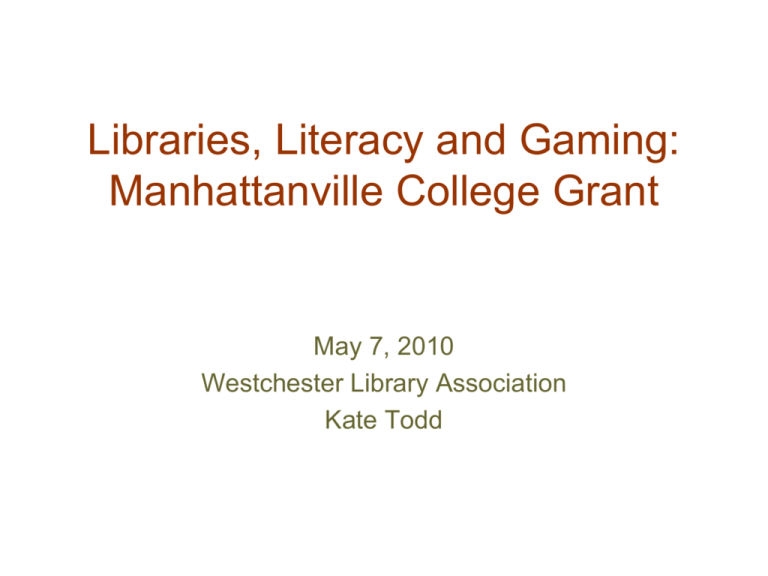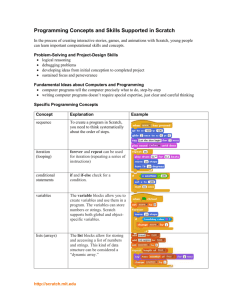Gaming - Westchester Library Association
advertisement

Libraries, Literacy and Gaming: Manhattanville College Grant May 7, 2010 Westchester Library Association Kate Todd Let’s Play a Game http://www.quia.com/rr/613221.html Psychology and Play Two psychologists theorized that “play” is an essential part of learning Jean Piaget Switzerland 1896 - 1980 Lev Vygotsky Russia 1896 - 1934 Education and Play Maria Montessori designed materials that emphasized learning through play Maria Montessori Italy 1870 - 1952 Example Teaches children: • Conservation of Matter • Manual dexterity • Eyes, hands Has the digital revolution changed “play”? If play has changed and education is linked to play, how does education need to change? Video games and education James Gee Marc Prensky Why use educational video games? 1. Use action instead of explanation 2. Create personal motivation and satisfaction 3. Accommodate multiple learning styles and skills 4. Reinforce mastery skills 5. Provide interactive and decision making context (Kebritchi & Hirumi, 2008) Gaming and Information Literacy Arizona State University • Designed a board game: Information Pursuit • Wanted to create digital version using Flash • Difficulty working with programmers • Student testers said “Too much text” • Project was much larger than planners anticipated University of Florida http://www.uflib.ufl.edu/games/bioactive/ • Bioactive • Programming with Inform 7, interactive fiction software • Screen shots not used because they get dated • Link out to library resources University of North Carolina • • • • • • Information Literacy Game Board game format Written by a librarian Used AJAX programming Available to other libraries Lessons learned: – Keep it simple – Testing is critical http://library.uncg.edu/game/ Trinity University • Blood on the Stacks • Introduction to library for Freshman • Residential school/ Used RAs • Positive feedback • Can it be re-used? http://www.trinity.edu/jdonald/bloodonthestacks.html Carnegie Mellon • Grant: $50,000 • Team of 8 librarians and game design students • Wanted to create 6 games • Only completed 2: – Within Range – I’ll Get It http://search.library.cmu.edu/rooms/documents/ libraries-and-collections/Libraries/etc/index.html Online Games Designed for Information Literacy Created by United States colleges and universities arranged by ACRL standards http://mville.libguides.com/standards Examples Industry Islands Created by Kognito Interactive For Baruch College Citation Tic-Tac-Toe Lesson created by Kate Todd. Citation Tic Tac Toe was designed by James Madison University. Quiz created using Quia. Manhattanville College Gaming Grant Student Created Games as a Tool for Academic Success A Different Approach • Provide students with an opportunity to create their own information literacy games • Training includes both library skills and game design • Students should then be able to share their products with other students Grant implementation Summer 2009 MAP program 17 students Introduction to Scratch 5 LIS topics 1. Manhattanville Library web site 2. Assignment planning/time management 3. Asking questions of librarians 4. Finding books in the library 5. Using a database to find periodicals 5 lessons in Scratch 1. Moving sprites on the stage 2. Using multiple sprite costumes 3. Interaction of sprites 4. Using variables for scoring 5. Communication among sprites • Students introduced to Scratch software • Students divided into 5 groups to prepare games on LIS topics Let’s look at student designed games Group 1: Asking questions of librarians • • • • Estefany, Ivan, Jordan, Myosha http://scratch.mit.edu/projects/mvilletodd/661410 Librarian is a bat Good conversation as example of asking questions • Shows understanding of link of subject to LC class to location on Tier 2 • Wanted to change background—something I had not taught them Group 2: Using a database to find periodicals • • • • • • Edwin, Madison, Nicole, Vanessa http://scratch.mit.edu/projects/mvilletodd/661397 Misunderstood assignment Used database to find this information Not about how to use database Drag and drop matching game about animal babies—finished one animal pair • Understood use of variable for scoring Group 3: Assignment planning/Time management • Abdoul, Courtney, Jennifer • http://scratch.mit.edu/projects/mvilletodd/661399 • Walker was from first Scratch lesson—built on what was learned in class • Little old lady stereotyped librarian • Again demonstrating link of subject to LC class to location, plus importance of asking librarian • Does not seem to picked up theme of assignment: time management Group 4: Finding books in the library • Alina, Elizabeth, J.R. • http://scratch.mit.edu/projects/mvilletodd/661401 • Breadth of role of book types and multiple uses of library • Again wanted to change background—important game element • Expanded beyond the basics of finding books Group 5: Manhattanville Library web site • • • • • • • Annesha, Avril, Max http://scratch.mit.edu/projects/mvilletodd/661403 Identifies four key areas of the library web site Uses quiz format Only finished first question Game building takes a long time Used that little old lady stereotype again What have we learned about gaming? • Games do help maintain student attention • Games are useful for student assessment • Students do not understand how or what they learn from games • Students who play games do not know how to create games • Some students do not enjoy video games What we have learned about LIS • The importance of real library places in understanding virtual spaces • LIS distinctions among topics is not intuitive to incoming students • Incoming freshmen do not find meaning in an introduction to database searching Next steps • Online course for developing Quia games offered to librarians • Offer complete LIS 2098, a course incorporating game design in Fall 2010 • Work with MAP students again this summer, saving some spaces in game design course References Alvarado, R. C. (2008). Overcoming the fear of gaming: A strategy for incorporating games into teaching and learning. EDUCAUSE Quarterly Magazine, 31(3). Retrieved April 5, 2010, from http://www.educause.edu/EDUCAUSE+Quarterly/EDUCAUSEQuarterlyMagazineVolum/Ov ercomingtheFearofGamingAStra/163094 Gee, J. P. (2007). What Video Games Have to Teach Us about Learning and Literacy (Revised and Updated Edition ed.). New York: Palgrave Macmillan. Harris, A., & Rice, S. E. (2008). Gaming in academic libraries : collections, marketing, and information literacy. Chicago: Association of College and Research Libraries. Kebritchi, M., & Hirumi, A. (2008). Examining the pedagogical foundations of modern educational computer games. Computers & Education, 51(4), 1729-1743. doi:10.1016/j.compedu.2008.05.004 Malone, T. W. (1980). What makes things fun to learn? Heuristics for designing instructional computer games. Symposium on Small Systems: Proceedings of the 3rd ACM SIGSMALL symposium and the first SIGPC symposium on Small systems, 162-169. doi: 10.1145/800088.802839 McCrea, B. (2010). Not Just Fun and Games. Campus Technology . Retrieved May 05, 2010, from http://campustechnology.com/articles/2010/03/03/not-just-fun-and-games.aspx Prensky, M. (2007). Digital Game-Based Learning. New York: Paragon House. Prensky, M. (2008). Students as designers and creators of educational computer games: Who else? British Journal of Educational Technology, 39 (6), 1004-1019. doi:10.1111/j.14678535.2008.00823_2.x Robertson, M. J., & Jones, J. G. (2009). Exploring academic library users' preferences of delivery methods for library instruction. Reference & User Services Quarterly, 48 (3), 259-269. Retrieved from Academic Search Premier database. Find out more at guide prepared by Kate Todd: Libraries, Literacy and Gaming mville.libguides.com/games



